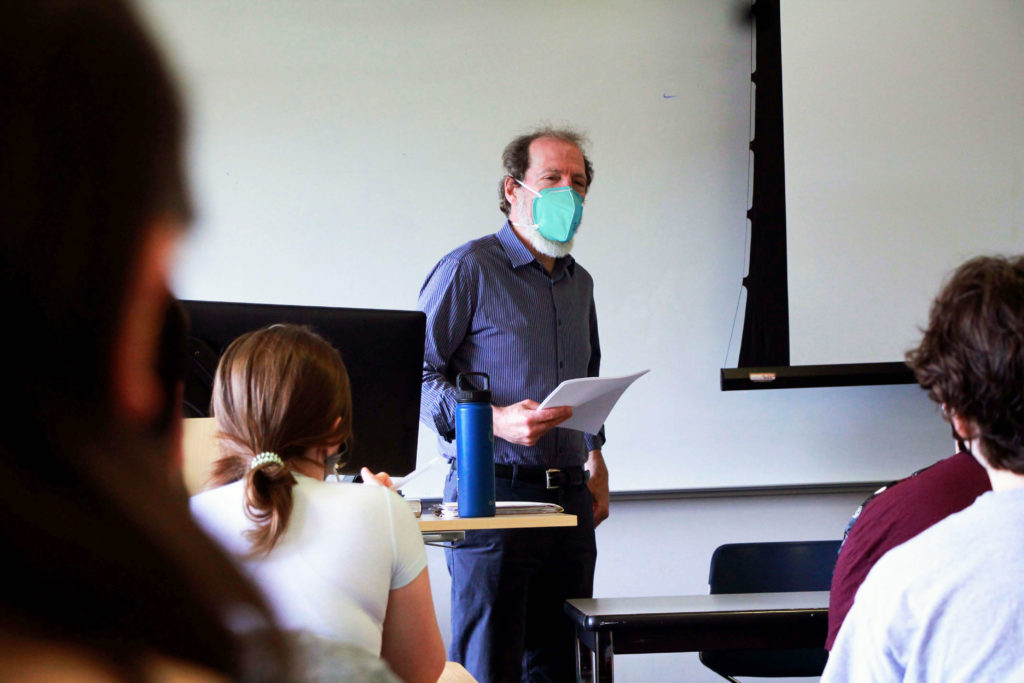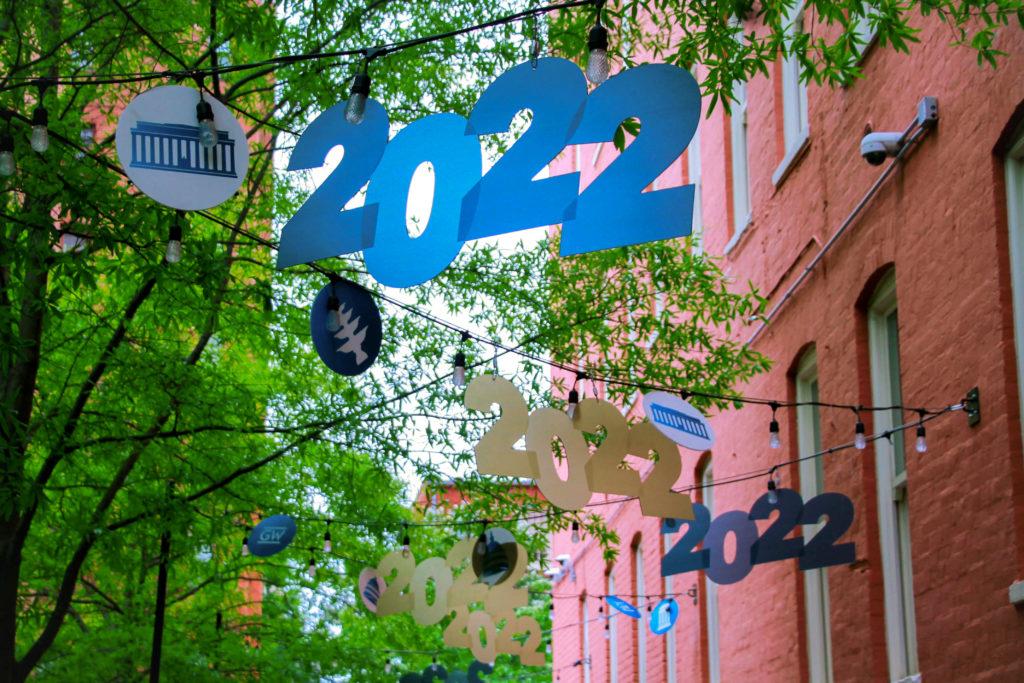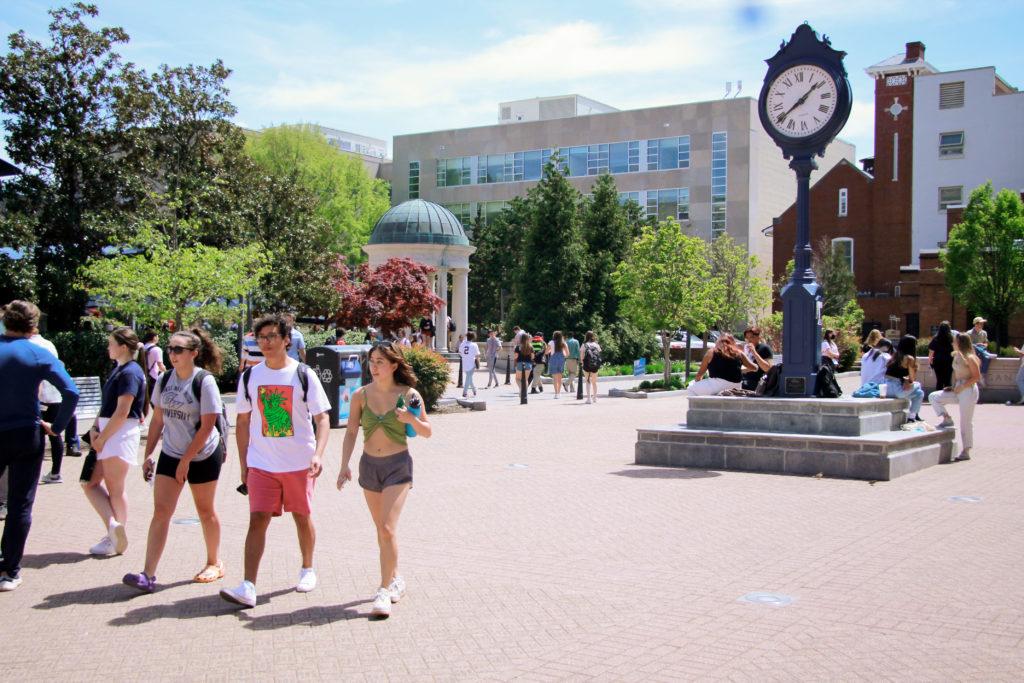The class of 2022 is about to complete a historic and unprecedented four years of college.
Graduating seniors arrived on campus a year and a half before the COVID-19 pandemic in an era of normalcy before online classes and mask mandates disrupted their GW experience grounded in classroom education and in-person interaction. Now approaching the first spring Commencement on the National Mall in three years, the class of 2022 readies to cap off their GW careers as the first – and so far, only – class to revert from in-person to online college life before returning to the physical campus once again as a testament to their arduous, yet rewarding journey.
Graduating seniors said the abrupt COVID-19 shutdown impacted their everyday college lifestyle as the social and academic benefits of attending college in person were stripped away. Yet throughout the ups and downs of the last four years, they all reaped valuable life lessons, like how to adapt to adverse challenges, and gained an appreciation for the time they had in person.
Nathaniel Dutt, an Arabic studies major and Navy ROTC cadet, said the pandemic was a “chaotic” and “awful” experience that limited his college career. He said online learning presented him with many distractions due to the social disconnect that comes along with remote learning – a challenge that intensifies with a major requirement to take language-based classes.
“Especially with my major being a language, it’s very difficult to learn that online when you’re isolated,” Dutt said. “You don’t have the in-person interactions that you can get in the classroom.”
But Dutt said his journey to gain a degree from the University was a success that helped him mature and earn his upcoming job as a Navy ensign.
“It’s not just a degree, like I got a career out of it,” Dutt said. “I’m going to the Navy, I’ve got job security. I’ve got a lot of emotional and physical maturity, life skills and friends.”
Alexa Nealy, an athlete on the women’s rowing team, said the shift in University’s COVID-19 policies made college life difficult but ultimately taught her values of patience and perseverance.
“These are things that just happen, and you can’t choose to stop living,” Nealy said. “You just have to move forward. It reminds me of what I’m capable of.”
Nealy said her teammates were able to empathize through shared experiences and schedules, so they helped her stay on track academically and supported her emotionally through the pandemic and online classes.
“I really mean it when I say that my teammates and my team in general is everything to me,” Nealy said. “Through COVID, they were pretty much the only people that I was even allowed to see, and I’m just so grateful for them.”
Justin Diamond, an international affairs major who tossed his hat into the ring of the Student Association’s presidential race during his freshman year, intends on pursuing a law degree after graduation concentrating in international trade.
Despite the uncertainties of the pandemic, Diamond found community with students who shared his interests through his participation and leadership in student organizations like the chess and philosophy clubs.
“I’ve never once doubted my choice to come here,” Diamond said. “There hasn’t been even a single shred of regret about coming to GW, and I don’t think I would have had a better time at any other university than I have here.”
In reflection, Diamond reaffirmed the platform of his infamous freshman year campaign for Student Association president as his parting advice to the next wave of students.
“I think abolish the SA is my final piece of advice to GW,” Diamond said.
Faculty members have watched students struggle with challenges ignited by the pandemic and have adapted their teaching methods to best fit the students in response. Professors said they found the sustained effort of the graduating class during remote instruction “impressive,” watching them succeed in their work despite the upheaval of their college experience during the pandemic.
Eric Saidel, an assistant professor in the philosophy department and the Director of Graduate Studies, said he noticed students would struggle to focus during the remote learning stint, which in turn docked their grades, so he carved out more time for students to connect with him and each other one-on-one via Webex despite the online setting.
“The goal was to be there for my students as best I could,” Saidel said in an email. “Using Webex meant that we weren’t limited to meeting only when I was on campus or only during office hours. That worked well for both them and me.”
Saidel said the Thacher-Reynolds Fellows, a group of three fellows from the philosophy departments, presented a presentation in defense of their senior theses, which stood out as one of his favorite moments because of the comradery he witnessed between students. Saidel said he was impressed with the theses and the level of engagement of the crowd, made up of peers of the recipients who asked the fellows challenging questions for them to address in defense.
“They all did such wonderful jobs,” Saidel said. “It was so great to see what they were capable of, but just as impressive was that other seniors showed up to support their friends/peers. They asked good, challenging questions.”
Robert Bruce Betz, an adjunct professor of political science who has been teaching at GW for the past 17 years, said he witnessed students grappling with increased anxiety and less confidence because of pandemic-related uncertainty during what was an “enormously disruptive” experience for them.
Betz said the class of 2022 will surpass his “great expectations,” because many of his students have risen to the challenges he presents in all of his classes. He said he’s always most proud of his current class, priding himself on pushing today’s students to surpass expectations rather than simply meet them.
“I think the reasons for hope for your generation are as boundless as the stars over your head at night,” Betz said.







